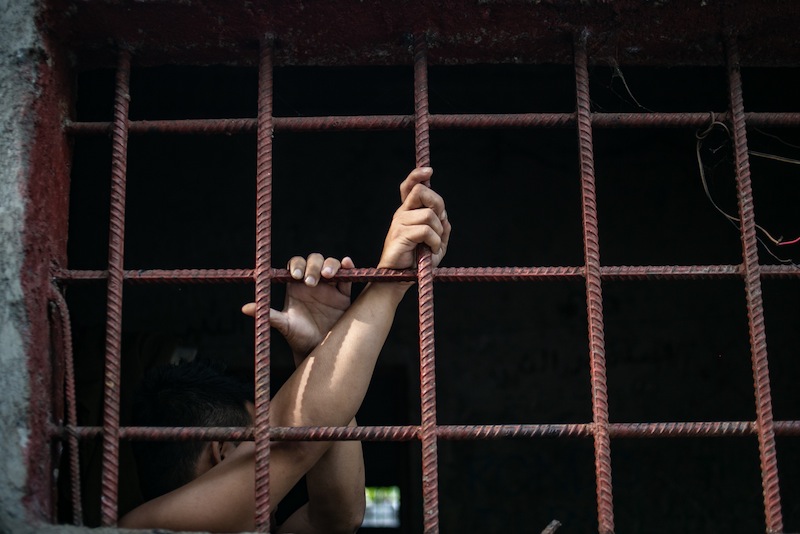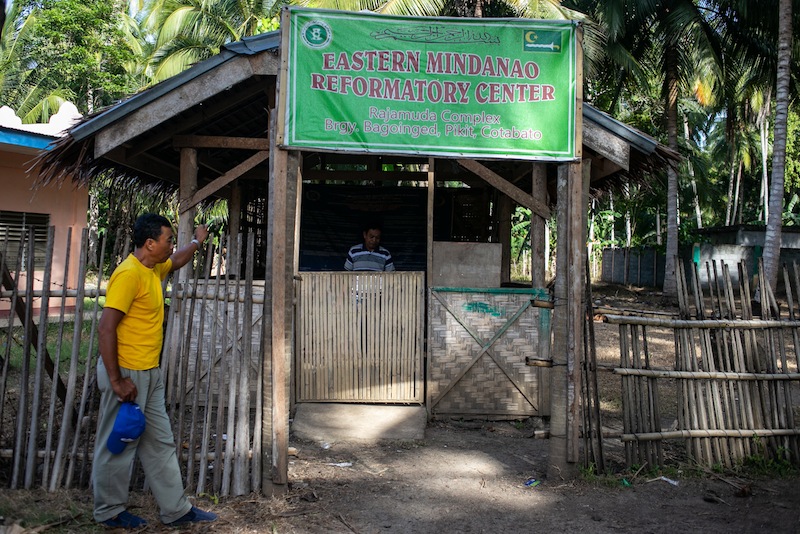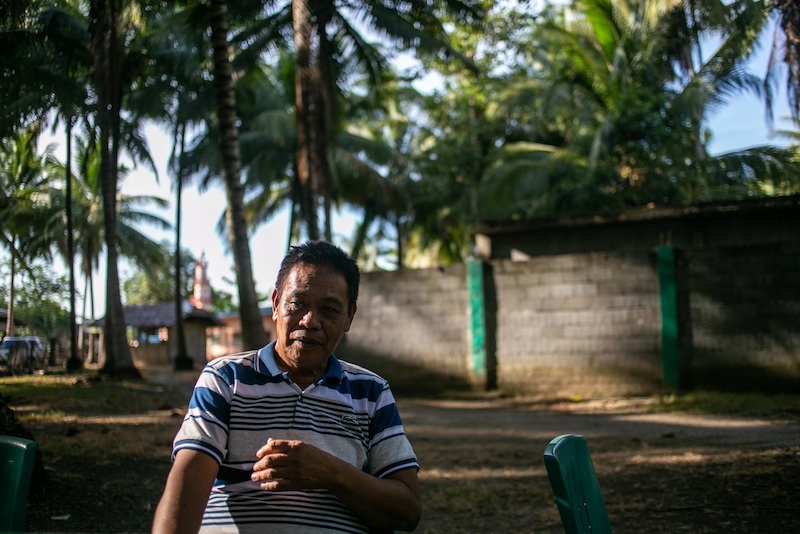BAGOINGED, Pikit, North Cotabato (MindaNews / 10 Feb) – Maguindanaon tricycle driver “Alex” is looking forward to reuniting with his family next month to begin a new life as father to five, the youngest of whom, the only daughter, was born three weeks ago.
Addicted to shabu for two years, “Alex” was brought to the Reformatory Center of the the Eastern Mindanao Front of the Bangsamoro Islamic Armed Force (BIAF), the soon-to-be-decommissioned armed wing of the Moro Islamic Liberation Front (MILF) in September last year, while his wife was five months preegnant.
 “Alex,” 26, a tricycle driver from a town in Maguindanao, father of five, has been staying at the Eastern Mindanao Reformatory Center of the Moro Islamic Liberation Front in Pikit, North Cotabato since September 9 last year. He wants to return home when he completes the minimum stay of six months and be father to his four sons and only daughter who was born three weeks ago. MindaNews photo by MANMAN DEJETO
“Alex,” 26, a tricycle driver from a town in Maguindanao, father of five, has been staying at the Eastern Mindanao Reformatory Center of the Moro Islamic Liberation Front in Pikit, North Cotabato since September 9 last year. He wants to return home when he completes the minimum stay of six months and be father to his four sons and only daughter who was born three weeks ago. MindaNews photo by MANMAN DEJETO
He was brought to this facility by his uncle, on instructions from his mother who works as a domestic helper abroad.
Having stayed five months in the reformatory, “Alex” has a month left to complete the minimum six-month stay here. (READ: Rehabilitating Moro drug dependents: “Islamization” as cure)
He told MindaNews he was brought here “para ma-recover” (to recover) from his addiction to shabu, quickly adding he was “biktima ng droga” (victim of illegal drugs).
Reformatory warden Yusoph Mohamad does not refer to “Alex” and nine others presently staying here, as addicts. He refers to them as “biktima ng droga” or “pasyente” (patients).
“Alex” was introduced to shabu by his fellow drivers.
He recalls that before he was sent to this reformatory, the cost of shabu was “300 to 500 pesos.”
His earnings as tricycle driver was 200 to 300 pesos a day, an amount less than the cost of the illegal drug.
How did he manage to still buy shabu?
“Kasi yung mga kasama ko … patak patak” (my companions and I would pool our funds to buy shabu), Alex replied.
And how frequent was this? “Araw-araw” (daily).
 A village councilor leads the way to the Eastern Mindanao Front Reformatory Center of the Bangsamoro Islamic Armed Forces, the soon-to-be-decommissioned armed wing of the Moro Islamic Liberation Front in Barangay Bagoinged, Pikit, North Cotabato. MindaNews photo by MANMAN DEJETO
A village councilor leads the way to the Eastern Mindanao Front Reformatory Center of the Bangsamoro Islamic Armed Forces, the soon-to-be-decommissioned armed wing of the Moro Islamic Liberation Front in Barangay Bagoinged, Pikit, North Cotabato. MindaNews photo by MANMAN DEJETO
He said his wife did not know he was into drugs. But his mother, who was abroad, learned about his addiction from their relatives and neighbors.
His wife, grandmother and his newly-born baby girl have visited him here.
“Alex” said Islamization has helped him process what he had gone through.
Mohamad had said “Islamization” or the process of instilling Islamic values in the “bikitma ng droga” is more effective than medicines.
In Filipino, he said, “If Islam enters the heart of anyone, even if you give him drugs, he will no longer use that because he is afraid of Allah. He will do no wrong.”
The reformatory accepts drug dependents like “Alex” for a minimum stay of six months and maximum of one year.
In his five-month stay here, “Alex” saw two of his fellow inmates “graduate,” a moment he is looking forward to.
“Alex” cannot say if he will return to his town or move to another placce with his family. But he is certain “hindi na ako gagamit” (I won’t use shabu anymore).
“Alex” wishes he could tell his fellow tricycle drivers to come here but “mga magulang ang pwede makahatid dito” (but only the parents can bring them here).
He was told of the plan to bring him to this reformatory but admitted his coming here was against his will.
When he was turned over to the warden on September 9, 2018 “grabeng pag-iyak ko dito” (I cried so much).
He cried for days. “Pangatlong araw grabe kalakas ang pag iyak ko dito” (on my third day here, I cried so much) because “na-realize ko na ang ginawa ko sa labas na hindi pala tama.”
 Yusoph Mohamad, warden of the Eastern Mindanao Reformatory Center of the Moro Islamic Liberation Front inside Camp Rajamuda in Barangay Bagoinged, Pikit, North Cotabao, explains why “Islamization” is the most effective way of rehabilitating a Moro drug dependent. MindaNews photo by MANMAN DEJETO
Yusoph Mohamad, warden of the Eastern Mindanao Reformatory Center of the Moro Islamic Liberation Front inside Camp Rajamuda in Barangay Bagoinged, Pikit, North Cotabao, explains why “Islamization” is the most effective way of rehabilitating a Moro drug dependent. MindaNews photo by MANMAN DEJETO
The “Islamization” program of the facility helped him, he said, as did the birth of his daughter which gave him more resolve to turn a new leaf. His wife and three-week old daughter had visited him here, a visit that made him cry again “dahil excited ako na makita ko ang anak na babae” (I was so excited to see my baby girl).
He said he told his daughter he was coming home because he has a family to attend to and a baby girl to take care of. “Uwi na ako kasi may anak na ako na babae,” said “Alex.” (Carolyn O. Arguillas / MindaNews)
